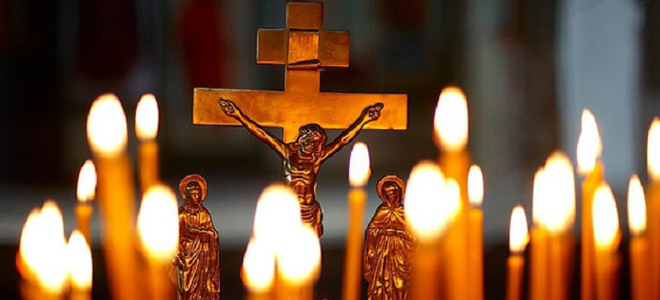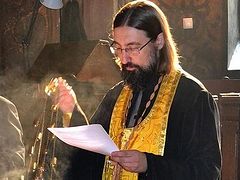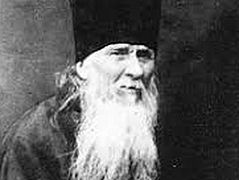But I would not have you to be ignorant, brethren,
concerning them which are asleep,
that ye sorrow not, even as others which have no hope.
(1 Thess. 4:13)
We can doubt whatever we please: Will it be cloudy or clear tomorrow? Will we be healthy or get sick? Will we be rich or poor? But of one thing there is no doubt—sooner or later, we will stand before God. Death is “the way of all flesh.” But, even knowing this, we still experience sorrow when we lose someone dear to us; and it’s understandable and explainable by human nature. After all, even when we just part with loved ones for a time, we are sad, we mourn, and we shed tears, and all the moreso when we face our last parting in this earthly life. The Lord Jesus Christ Himself, when He came to the home of his reposed friend Lazarus, was grieved in spirit and wept, He so loved Him. But believers have a great consolation that helps them survive the death of a loved one—prayer for their departed. And this prayer connects us like a thread with the world of those who have already departed.
Everyone who loses a loved one asks the question, “What else can I do for my loved one?” Indeed, when our loved ones are ill, we rush to help, we go to the hospital, we buy them groceries and medicine; if they’re in some other kind of trouble we also help as we are able. Our love is expressed in this compassion, and our commiseration with them.
But someone who has reposed is no less, and perhaps even more in need of our care.
Man does not disappear as a person with the death of the brain and cardiac arrest. Besides the body (a temporary covering), he has an eternal, immortal soul. God is not the God of the dead, but of the living (Mt. 22:32). It is precisely the soul that is the essence of man. And we love (if we truly love) our loved ones not for their beautiful bodies and physical strength, but for the qualities of their soul: intelligence, kindness, character, love—all of these qualities of the soul of our loved one that make up his image. The body is the clothes of a man; it grows old and sick, it changes, and it experiences irreversible processes. Sometimes, looking at the remains, lying in the coffin, we don’t even recognize a familiar face in them, so much has the reposed changed. But the soul has no age; it is immortal. It’s not for nothing that they say, “He’s a young soul”—and the man is already sixty.
Since our loved one is immortal, he is in need of our help and support there, beyond the bounds of this earthly life. So, what does he seek from us, and how can we help him?
Of course, nothing earthly interests the reposed anymore. They do not need expensive tombstones, extravagant wakes, and so on. They need only one thing—our fervent prayers for the repose of their souls and for the forgiveness of their voluntary and involuntary sins. The reposed cannot pray for himself anymore. St. Theophan the Recluse says that the departed are in need of prayer, “as the poor of a piece of bread and a cup of water.”
We must pray, repent of our sins, and approach the Mysteries of the Church in our earthly life, for it is given to us as a preparation for eternity; but when a man dies, the result of his life is already summed up, and he can in no way change it for the better. The reposed can only rely on the prayers of the Church and of those who knew and loved him during his life, and the Lord can change the fate of the deceased by the prayers of his relatives and friends. There are innumerable instances from Church Tradition and the lives of the saint that testify to this. An amazing case is described in the ancient life of St. Gregory the Dialogist. The holy hierarch boldly prayed for the repose of the cruel persecutor of Christianity, Emperor Trajan. Trajan not only raised up persecution against Christians (for he did not know what he was doing), but was a just and merciful ruler who took great care for the poor among his subjects. St. Gregory found out that the emperor had protected a widow in a calamitous situation, and took upon himself the podvig of prayer for him. It was revealed to him by God that his prayer was accepted. This example (and many others) is a great comfort and inspires us in our prayers for the reposed. Even if the departed was far from the Church, he can receive relief from his lot by the diligent, tearful prayers of his loved ones.
Another very important point: If someone who has left us didn’t live a Church life, or we know that his life was far from the commandments of God, his loving relatives should be especially attentive to their own souls. We are all interconnected with our relatives and friends, as parts of one body: And whether one member suffer, all the members suffer with it (1 Cor. 12:26). If some organ is inactive, then a man’s other senses intensify, and his other organs take on an additional load, and its functions. And if our loved one didn’t manage to do something in his spiritual life, we should make up for it for him. We will thereby save our own soul and bring great benefit to his soul. There’s a military song about a pilot who died, whose comrade says that he lives on the Earth “for himself and for that man.” And our life for others, in memory of someone can be expressed in our fervent prayer, in the acquisition of Christian virtues, in generous almsgiving in commemoration of the reposed.
It happens quite often that people who went to church very rarely and lived a carefree, secular life, start coming to church and become true Orthodox Christians after having lost a loved one. Their life completely changes; they come to God through grief. And, of course, they then pray their whole life for their departed relatives. The ways of the Lord are inscrutable.
Believers, and those who are far from the Church perceive the loss of a loved one absolutely differently. Sometimes I end up at the memorial of an unreligious person, and I observe what a painful spectacle it is. One time I participated in the funeral of a famous neurologist and very good man. The Lord took him before he was old, after a sudden, fleeting disease, at the peak of his medical activity. When his colleagues began their eulogies, you could see what bewilderment and numbness the mystery of death plunged the unreligious people into. Almost everyone considered it their duty to begin with something like, “What a terrible injustice… He left us so early and so suddenly… There’s so much he could have done still,” and so on. It’s obvious that such speeches can’t bring consolation to the family and friends of the deceased, but rather, on the contrary, they only deepen their sorrow. Even if you don’t believe in anything, you can still say kind, warm words to friends and colleagues. What causes this? Why are people in such a state of confusion in the face of death, avoiding even mentioning or thinking about it in daily life? Fear and uncertainty. Death scares them; they don’t know what awaits them. Is there life there? Or do we only live here, in the material world? For unbelievers, how to prepare for death and how to relate to it is a seven-sealed mystery. Even official speeches contain the usual wish: “May he rest in peace”—which conceals within itself the underlying question: Is this really everything? The body is in the ground—and then, nothing?
With the death of their loved ones, those who are far from faith often fall into despair, despondency, and black depression. That’s it, life is over; if my loved one is no more, he has ceased to exist, life has no more meaning. I can’t say that believers don’t mourn the death of a loved one, but they have a completely different attitude towards death. Christian sadness is light; we know that man lives forever, that death is just a separation, that his life continues, but in a different capacity. We know that we are connected with the reposed by the bonds of prayer and love. We cannot say, “There was a man, and now there’s not.” If we loved him in his lifetime, then we continue to love him in death. Love never fails, the apostle Paul says (1 Cor. 13:8). When I have lost loved ones, I have always had a feeling of separation, not of termination—as if they went somewhere very far away, but not forever.
Excessive sorrow is inappropriate because it not only destroys our own soul (despair is one of the eight deadly sins), but it doesn’t allow us to pray for the departed. An emptiness forms in the soul of a despondent man, a vacuum, and generally, he can do nothing, and especially not pray. But our loved ones are sorely in need of our help! But we not only do not help them by despondency, depression, and despair, but we also, perhaps, bring suffering. For the sake of our loved ones, we must get ahold of ourselves, calm down as much as possible, and put all our energy into prayer. The reposed are especially in need of our fervent prayers until the fortieth day.
The human soul, leaving the body, experiences unease and fear: It was accustomed to dwelling so many years in its home; it does not know what awaits it and where the Lord will send it. After death, a man gives answer for his entire life, and here his future lot is determined. It’s very important to support the soul of a loved one with commemorations at the Divine Liturgy, the reading of the Psalter, and in private prayers.
Relatives of the deceased often think that if they don’t show others their sadness, everyone will think they didn’t love the departed, and you will sometimes see a heartbreaking sight, with hysteria, lamentation, and wailing over the reposed. This is especially true in villages where the tradition of special wailers has been preserved. People drive themselves into a complete frenzy. What kind of prayer is there in this? True grief and sorrow, as a rule, are quiet and almost imperceptible to others. Sometimes, people who sorrow and weep for the departed too much are actually sorrier for themselves: How poor, unhappy, and lonely they are now.
We inherited all of these traditions from pagan ceremonies, and, obviously, they are incompatible with Orthodoxy.
But we, Orthodox Christians, must dissolve our sorrow with Christian hope, that if we ourselves will be saved, and if we will save our loved ones by our prayers, then we dare to believe that we will meet them there, in the other life. And if they reach the Heavenly Kingdom, then they will certainly pray for us there.





